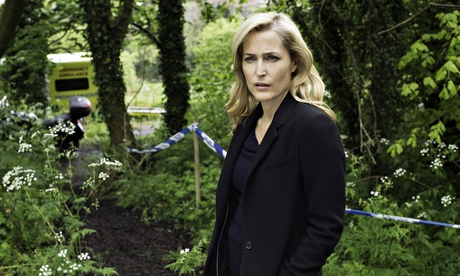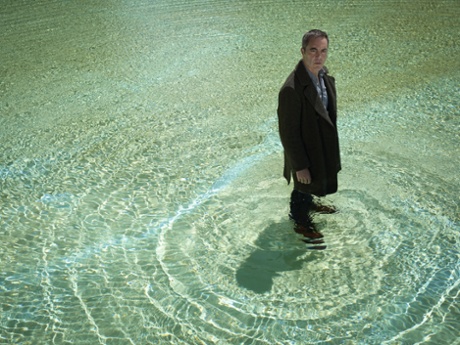
The Fall (BBC2) | iPlayer
The Missing (BBC1) | iPlayer
When The Killing was first shown on British TV, back in early 2011, it was a chastening revelation. We had grown used to American cable TV producing intelligent and compelling serialised drama, but the idea that the Danes could do it on their state-backed channel was far more challenging to address, because it implicitly raised the question of why the British couldn’t.
Almost four years on and we are now living in a post-Forbrydelsen TV world, in which well-written, well-acted drama series featuring a ghastly crime are almost commonplace. In the past 18 months alone there has been Broadchurch, The Fall (first series), The Tunnel, Happy Valley, Line of Duty (second series) and The Missing. And now the second series of The Fall.
One of the breakthrough effects of The Killing is that it brought a new level of authenticity to the depiction of emotional suffering – both that of the victim’s family and the stunted and isolating effect it had on the detective heroine, Sarah Lund. It balanced violence against women with a strong (albeit damaged) avenging woman. And while its narrative momentum was strictly whodunnit, its psychological outlook was bleak and reflective.
That combination of tropes has quickly redefined a genre. To a greater or lesser extent, the British series that have followed in The Killing’s wake all conform to it, though perhaps a notable exception is The Fall. There’s bleak reflection aplenty and a strong avenging woman; but crucially, the identity of the killer was known to the viewer from the outset of series one.
It was a novelty that enabled several distinctive developments. First of all, in a story of disturbing voyeurism, the audience was placed in the uncomfortable position of watching the killer. Second, it obviated the diminishing returns of dangling different suspects to maintain suspense. And finally, it humanised a psychopath in a manner that posed awkward questions about why we – and particularly many women – are attracted to violent women-in-peril thrillers. It did this because the homicidal sadist was not some socially inadequate loser, but a softly spoken Ulsterman called Paul Spector, with a wife and a beloved child, and a job as a bereavement counsellor; and he was played by the former male model Jamie Dornan – sort of Jude Law’s better-looking, brooding younger brother.
Spector invaded the imagination with the same stealthy calculation that he invaded his victims’ homes. But what did it mean to have such a seductive killer at loose in our minds?
Fortunately, there was the fabulous Gillian Anderson as Detective Superintendent Stella Gibson to distract us from that question. With her coolly composed demeanour and powerfully assertive sexuality, she was a fitting female fantasy to combat Spector’s horrific charm. Yet at the end of series one it was the killer who looked to have triumphed.
The first episode of series two, written and directed by Allan Cubitt (who wrote the first series), was situated about a week after the last series ended, with Spector in his Scottish hideaway, his family having returned home to Belfast. Gibson had only a few leads and the investigation had stalled; the atmosphere was, if anything, more downbeat than the first series. There was also a sense that the story did not have many places to go, other than into territory that might undermine its original dramatic integrity.
Even the most intelligent thrillers are only as plausible as their weakest scenes. When the returning Spector asked a young woman if he resembled a newspaper photofit of the killer, she told him he did. She also told him that she had been so frightened by the killer’s targeting of brunettes that she dyed her hair blond. However, she then gave her address to him by showing him her driving licence. Death wish or slack plotting?
There were several other unlikely moments that almost dissipated the meticulous menace of the first series, but Dornan and Anderson remain magnetically watchable, and the tension is still on a level that necessitates the double-locking of doors and windows.
Equally transfixing is James Nesbitt as the tormented father Tony Hughes, in search of his abducted son in The Missing. Although slightly more conventional than The Fall, The Missing is also a first-rate piece of television drama, and makes inspired use of its two time settings.

So far it has resisted the temptation to suggest suspects, other than Tony himself – an idea that was explored last week by the police, without much reward. Nesbitt pinballed between anger, defeat and desperate hope like a man who, having long struggled to control his emotions, has lost all his systems of constraint.
Instead of a woman, it’s the fine Turkish-French actor Tchéky Karyo, as the veteran sleuth Julien Baptiste, who offsets Nesbitt’s volatile character. His is a great performance, full of warmth and sympathy.
Again, while so much of the drama is perfectly pitched, it’s almost impossible to maintain the spell across several episodes without the occasional nagging doubt intruding. I can let Baptiste’s reappointment pass, but the ultra-obnoxious journalist, played by Arsher Ali, is a little difficult to swallow. I don’t think that’s professional defensiveness, for there are certainly plenty of journalists I’ve come across whom I don’t much like. Rather, it seems as though Ali’s character has been written for another TV series, one with much less interest in the kind of social accuracy that The Missing so regularly displays.
But these are minor flaws, and both The Missing and The Fall are major dramas that, four years after The Killing, place British TV firmly at the very front of the crime genre.







